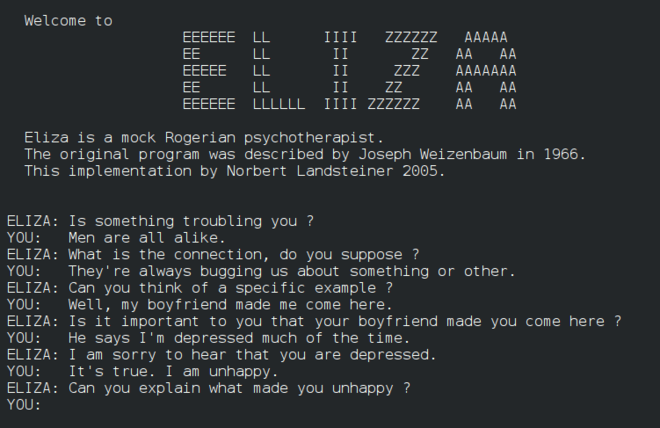1960s chatbot ELIZA beat OpenAI’s GPT-3.5 in a recent Turing test study | Ars Technica
Eliza, Computer Therapist
ELIZA is a computer program that emulates a Rogerian psychotherapist. Just type your questions and concerns and hit return. Eliza will answer you.
When the original ELIZA first appeared in the 60's, some people actually mistook her for human. The illusion of intelligence works best, however, if you limit your conversation to talking about yourself and your life.
miguelgrinberg/Eliza-GPT: The classic chatbot from the 1960s running on OpenAI's Chat Completions API. @ GitHub, Python, no license
Eliza, the classic chatbot from the 1960s, running on OpenAI's Chat Completions API.
Eliza-GPT: The Classic ELIZA Chatbot Running On OpenAI's Chat Completions API - miguelgrinberg.com
related examples
eliza-chatbot · GitHub Topics GitHub topics search, can select language
IUseDebianBtw/Neo-ELIZA: Neo-ELIZA is a modern implementation of Eliza as Chatgpt
@GitHub, python, GPL3
In the early 1960s, the well-known early artificial intelligence (AI) program ELIZA made a big impact after showing its ability to process input and produce output expressed in natural language. ELIZA was one of the first conversational agents in AI, designed to simulate intelligent conversations, also known as chatbots. Developed by Joseph Weizenbaum at MIT, ELIZA had several modules to interact in English, German, and Welsh, and different modes of operation. The most famous was a module that simulated the interaction with a Rogerian psychotherapist
ELIZAGEN - Original ELIZAMost people who know anything about Joseph Weizenbaum's ELIZA at the level of the program code think that it was written in Lisp and that it has been floating around since the publication of Weizenbaum's 1966 CACM paper. However, surprisingly, the ELIZA program itself was never published, and it wasn't written in Lisp, but in a now-obscure language called MAD-SLIP running on an IBM 7094 computer at MIT. Until now, the ELIZA source code has been missing, presumed by many to be lost, and because many alternate versions have been created over the years, the original source code remained undiscovered.
ELIZA is an early natural language processing computer program developed from 1964 to 1967[1] at MIT by Joseph Weizenbaum.[2][3] Created to explore communication between humans and machines, ELIZA simulated conversation by using a pattern matching and substitution methodology that gave users an illusion of understanding on the part of the program, but had no representation that could be considered really understanding what was being said by either party
from openai import OpenAI
openai_client = OpenAI(base_url='http://127.0.0.1:5005/v1', api_key='x')
messages = [
{"role": "system", "content": "You are a helpful assistant."},
]
while True:
user_message = input("You: ")
messages.append({"role": "user", "content": user_message})
completion = openai_client.chat.completions.create(
model="gpt-3.5-turbo",
messages=messages,
)
response = completion.choices[0].message.content
print('Eliza:', response)
messages.append({"role": "assistant", "content": response})

